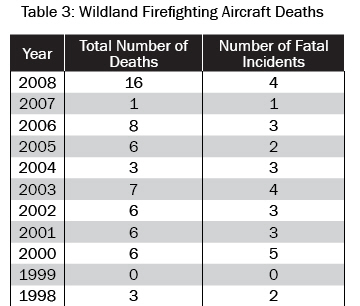The U. S. Fire Administration has issued their annual report about firefighter fatalities. A sizeable portion of the report deals with wildland firefighters. The cover photo is from the memorial service for the nine firefighters and pilots that died in the Iron 44 fire helicopter crash in northern California.
Here are some excerpts.




Wildland Firefighting Deaths
In 2008, 26 firefighters were killed during activities involving brush, grass, or wildland firefighting. This total includes part-time and seasonal wildland firefighters, full-time wildland firefighters, and municipal or volunteer firefighters whose deaths are related to a wildland fire (Figure 5).
- Two firefighters died when their brush truck was involved in a noncollision fall due to structural collapse of a bridge they were crossing that had been undermined by fire.
- One firefighter was killed when the Single Engine Air Tanker (SEAT) he was piloting crashed.
- One firefighter died of a heart attack while riding in a grass truck responding to an outdoor fire.
- One firefighter died of multiple blunt trauma when he was struck by a vehicle entering the scene of a multiple vehicle collision. A contributing cause was heavy smoke from an outdoor fire and fog obscuring vision along the roadway. A sheriff’s deputy was also struck and killed and another deputy was injured in the incident.
- One firefighter died from a nontraumatic brain hemorrhage several hours after returning with his Strike Team from the scene of a wildland fire.
- One firefighter died when the medical helicopter he was being transported in collided with another medical helicopter, killing the firefighter and six others. The firefighter had been battling a fire on the north rim of the Grand Canyon National Park when he was bitten by an insect and taken to a nearby hospital for treatment. While in the hospital, he suffered anaphylactic shock from the antibiotics being used to treat the insect bite and it became necessary for the firefighter to be flown to a larger medical center.
- One firefighter assigned the position of lookout on a wildland fire was helping carry hose up a hill when he experienced extreme fatigue and respiratory distress. He was transported to the hospital where he died the following day from a massive heart attack.
- One firefighter working tree felling operations was struck and injured by a tree. Due to heavy smoke conditions, the firefighter had to be carried a distance before he could be evacuated by a U.S. Coast Guard (USCG) helicopter. While being transported aboard the helicopter, the firefighter went into cardiac arrest and died.
- One firefighter, in preparation to assume management responsibility for a wildland fire, was scouting the area of operations when the fire spread quickly and burned over his position.
- Nine firefighters, including two pilots assigned to the Iron Complex fire, were killed when their helicopter experienced a loss of power to the main rotor during takeoff, and subsequently impacted trees and terrain.
- One firefighter died from a heart attack a short time after he returned home from fighting lightning-caused wildland fires.
- One firefighter died from injuries sustained from a fall while scouting a fire in extremely rough terrain and dangerous rock cliffs.
- One firefighter died from injuries sustained when he fell from a piece of heavy machinery while clearing fire breaks.
- Three firefighters, two pilots, and the crew chief of an air tanker under contract with the USFS, crashed moments after take-off.
- One firefighter collapsed and died from a heart attack while supervising a prison firefighting crew.
Thanks Dick
